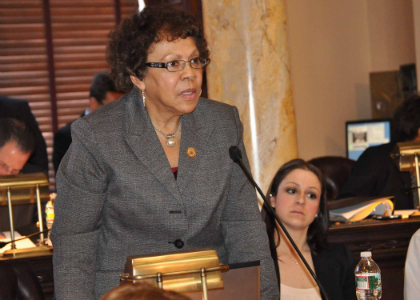
TRENTON – Legislation sponsored by Senator Shirley K. Turner to permit the Motor Vehicle Commission (MVC) to establish a restricted use driver’s license endorsement and to require the agency to provide affordable surcharge payment plans cleared the Senate Law and Public Safety Committee today.
“The need for a driver’s license to obtain employment is paramount in New Jersey,” said Senator Turner (D-Mercer/Hunterdon). “People who don’t drive are less likely to find a job because most employers require one and because it’s impossible to access jobs that are situated beyond the bus routes. It’s a catch-22. Drivers with huge surcharges get suspended because they cannot afford their surcharges, and they cannot find employment to help pay down their surcharges because they do not have a driver’s license. We need to stop punishing people who are too poor to pay and who get caught in a vicious cycle of license suspension and indebtedness.”
The bill, S-654, would permit the MVC to issue a restricted use driver’s license endorsement for drivers whose licenses have been suspended or revoked for failure to pay motor vehicle surcharges or for accumulation of motor vehicle penalty points. Drivers with an accumulation of motor vehicle penalty points must first attend a Driver Improvement Program offered by the MVC before being eligible for the endorsement. A person convicted of drunk driving or refusing to take a breathalyzer test would not be eligible for an endorsement. The restricted use license would allow the driver to operate a motor vehicle exclusively to and from work, an accredited educational institution, a mandated treatment program, a health care facility, or a child care facility.
Thirty-nine states and the District of Columbia have restricted or conditional use driver’s licenses for individuals with license suspensions. According to research conducted by Rutgers University, most states consider their programs to be effective. Some states noted that they have reduced the number of habitual offenders, reduced unemployment, and helped families to avoid serious hardships.
“Drivers that get suspended will often take the risk of driving to avoid losing a job; however, when they get caught, they face even more fines and surcharges and longer suspensions,” said Senator Turner. “People in urban areas are particularly affected by license suspensions for failure to pay surcharges. The state found that 59 percent of drivers suspended for failing to pay surcharges live in urban communities. People that live in urban areas are poorer, minorities, and experience higher unemployment. We should be eliminating barriers to employment to make it possible for more individuals to secure jobs and get to work and be less reliant on government programs.”
The other bill released from committee, S-646, would require that the MVC enter into a monthly installment plan for the payment of motor vehicle surcharges upon the written request of a driver with outstanding surcharges. The bill would prohibit the MVC from denying any request to enter into a monthly installment plan. The bill would also extend the time period for monthly installment payments. Under the bill, a driver is authorized to pay assessments on an installment basis for a period not to exceed four years for assessments under $2,300, or not exceeding six years for assessments of $2,300 or more.
Turner noted that New Jersey is one of only four states that have a surcharge program. The surcharge program was established in 1983 to reform the automobile insurance system and modernize the Division of Motor Vehicles. The program was supposed to expire in three years; however, it has continued to pay bond obligations and to increase the revenue stream.
“Drivers with surcharges have already paid the penalty for their driving indiscretions through the court system,” said Turner. “The surcharge is an extra administrative cost that almost no other states have, and it ends up punishing those who can least afford to pay. We should provide a mechanism that provides our drivers with the chance to drive legally for restricted purposes and to pay their surcharges in an affordable way to help people avoid repeated suspensions and extra costs. As it stands now, the surcharge program is a regressive program that has nothing to do with driver safety and more to do with balancing the budget on the backs of the poor.”
The bill S-654 cleared the committee 3-1. Bill S-646 cleared the committee 4-0. Both bills now head to the Senate Budget and Appropriations Committee.


